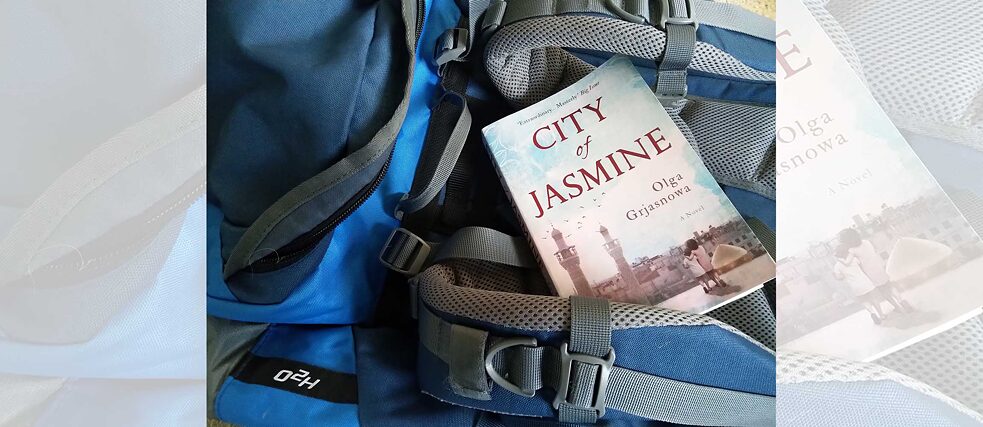January 2021
Olga Grjasnowa: City of Jasmine

It’s fair to say that Exit West, the most recent novel by British-Pakistani author Mohsin Hamid, met with mixed reactions. Personally, I found myself drawn in by the richly detailed portrait of Saeed and Nadia, an ambitious young couple whose city is upended by war and revolution and who end up fleeing – to Mykonos, London, San Francisco. For some readers, however, the novel’s central conceit – of mysterious black doors which function as portals between different places – was confusing at best, and at worst obscured the very real dangers which refugees face on their journeys to find a place of safety.
Either way, if you’re interested in the themes Hamid grapples with in the book, I’d recommend picking up Olga Grjasnowa’s City of Jasmine, in a vivid translation by Katy Derbyshire. The novel traces the lives of Amal, Hammoudi and Youssef, all of them young and talented, their ambitions disrupted abruptly by Syria’s civil war. As in Exit West, one of the strengths of the novel is in detailing the normality of its characters’ lives before – and in part even during – the war. Amal has a comfortable flat paid for by her father, attends her classes at the Institute for Dramatic Arts with a hangover and goes underwear shopping with an indecisive friend. In one of my favourite scenes, after Amal’s terrace is requisitioned by government snipers, she spends a whole day creating a feast for an impromptu party, with Youssef recognising that it might be the last one for a long while. These scenes go hand-in-hand with Amal’s first tentative appearances at pro-democracy protests, the fear which “has settled in like a parasite building a nest inside her ribs”, the anonymous phone calls she starts to receive, clearly from the secret service.
The city Saeed and Nadia flee in Exit West remains unnamed throughout the novel, a stand-in for any one of multiple cities which have come under Islamist rule in the Middle East. City of Jasmine, in contrast, is deeply rooted in time and place – Damascus and Deir ez-Zor at first, and later Beirut, Istanbul, Italy, Berlin. Some details of the pro-democracy protests and later of the Islamist insurgence seemed so plausibly real that I had to resist the temptation to reach for my phone, to separate fact from fiction.
Neither book, however, shies away from unpicking the West’s complicity and callousness, and City of Jasmine does so with a grim kind of humour – a humour Derbyshire’s translation captures perfectly. When Amal and Youssef reach Italy despite dodgy ships and fake life jackets, they discover that “after survival comes bureaucracy.”
After settling in Germany, Amal swallows her pride to audition for a cooking show: "The concept is apparently to present dishes from countries roughly grouped together under the term ‘unsafe third countries’. The working title is Refugees Can Cook Too."
Full of the sounds, smells and tastes of what for Amal, Youssef and Hammoudi is home, City of Jasmine is a vivid, sensual novel. But above all ‘God is Not Shy’, as the book is called in German, is a novel of witness, asking the reader too to bear witness and to not turn away.
About the author
Annie Rutherford is an incorrigible bookworm and Jill of all (word-based) trades. She is the programme co-ordinator at StAnza (Scotland’s international poetry festival), a German-English literary translator, and runs Lighthouse Bookshop’s Women in Translation book group, among other things. She has been known to read while cycling (she does not recommend it), and can spot a misplaced apostrophe at a distance of fifty yards.Borrow the book in English translation digitally via the eLibrary.
Borrow the original German title digitally via the eLibrary.
Reserve your copy in our library in Glasgow or London.
Find out more about the blog.
Back to the Book Blog